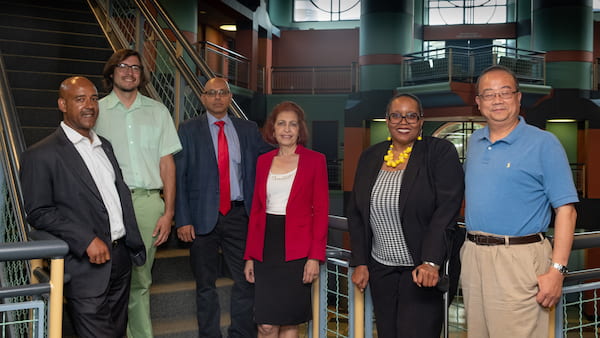Rice leads effort to boost underrepresented minorities in academia
Federal grant to Rice, University of Houston, Texas Southern will open doors for future professors
Rice University’s Brown School of Engineering, in partnership with colleagues at Texas Southern University (TSU) and the University of Houston (UH), has won a multimillion-dollar grant to help increase the number of underrepresented minorities pursuing academic careers in engineering and science.
The National Science Foundation grant for $2.66 million over five years is part of its Alliances for Graduate Education and the Professoriate (AGEP) program, which seeks to “advance knowledge about models to improve pathways to the professoriate and success” for historically underrepresented minorities in science, technology, engineering and math (STEM) disciplines.
The award to Rice, the lead institution, and its partners is specifically for those in data engineering and data science disciplines. It will fund a program to be called AGEP STRIDES (Strengthening Training and Resources for Inclusion in Data Engineering and Sciences).

Rice University, Texas Southern University and the University of Houston have won a National Science Foundation grant to help underrepresented minorities pursuing academic careers in engineering and science. The principal investigators are, from left: Reginald DesRoches and Canek Phillips of Rice, Pradeep Sharma and Hanadi Rifai of the University of Houston, Yvette Pearson of Rice and Wei Wayne Li of Texas Southern University. Photo by Jeff Fitlow
“We can’t overstate how important and timely this project is,” said the grant’s principal investigator, Reginald DesRoches, the William and Stephanie Sick Dean of the Brown School and a professor of civil and environmental engineering and of mechanical engineering. “We are at a unique time when the economy is dominated by companies in the computational and data science domain.At the same time, we know these industries remain among the least diverse.”
He noted Rice’s development of The Ion as the focal point of a new innovation and technology district gives Houston, one of the nation’s most diverse cities, a unique conduit toward diversification in burgeoning high-tech fields.
“Although the grant is focused on getting more underrepresented minority Ph.D. and postdoctoral fellows into academia, this will have a direct impact on diverse undergraduates pursuing degrees in the data engineering and data science fields,” DesRoches said.
The institutions expect AGEP to enhance tech companies’ bottom lines as newly minted academics develop the diverse workforce of the future.
“Data science and engineering have so many broad applications that they touch on all of Rice’s engineering disciplines in some way,” said Yvette Pearson, associate dean for accreditation, assessment and strategic initiatives at the Brown School and co-investigator with Rice postdoctoral researcher Canek Phillips, TSU computer scientist Wei Wayne Li and UH civil and environmental engineer Hanadi Rifai and mechanical engineer Pradeep Sharma.
Pearson said the program will create opportunities for researchers to engage with each other across campuses and provide faculty with guidance on mentoring inclusive research teams. It will also hold quarterly training programs not only to prepare future faculty members to lead research teams, but also to encourage entrepreneurship.
“We recognize that faculty members are expected to transfer their technologies to the public realm,” Pearson said. “They do all of these great things in their labs. Then what?
“Equipping future faculty to engage in research with an entrepreneurship lens will help them be more competitive,” she said.
A major component of the program is an investigation to identify factors that help and hinder underrepresented minorities as they apply for faculty positions.
“Research conducted by the Kapor Center shows tech companies’ hiring practices are biased towards candidates from ‘top-ranking universities’ and against ‘candidates with ethnic-sounding names,'” Pearson said. “We believe this holds true for many STEM faculty hires as well. We will investigate this along with other systemic barriers and inequities. Ultimately, we want to see the results of our research put into practice to help remove those barriers.”
Pearson said the program will focus on current Ph.D. candidates and postdoctoral fellows. “Faculty members at all three institutions who are engaged in some aspect of data engineering and data science and research, along with Rice’s Data to Knowledge Lab, will help us identify participants,” she said. “We have a lot of common events planned.”
Rice was among the first universities in the nation to win an AGEP grant when the program was introduced in 1998. The program was directed for more than a decade by University Professor Richard Tapia, also the Maxfield-Oshman Chair in Engineering, Professor of Computational and Applied Mathematics and winner of the National Medal of Science.
The new project will work in tandem with an AGEP grant to Rice, Georgia Tech, Florida Agricultural and Mechanical University and the University of Colorado focused on advancing underrepresented minority postdoctoral researchers into faculty positions. Rice’s portion of that project is administered by Illya Hicks, a professor of computational and applied mathematics, and Fred Higgs, vice provost for academic affairs and the John and Ann Doerr Professor in Mechanical Engineering.
“A lot of people will have a great deal of input into what we’re doing,” Pearson said. “Some get the sense that diversity, equity and inclusion are the responsibility of certain subsets of people.
“And that is not true,” she said. “It’s all of our responsibility. I want this to become business as usual, and this AGEP award will enable us to make great strides in that direction.”

